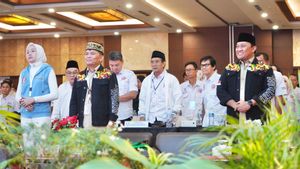JAKARTA - Minister of Religion (Menag) Yaqut Cholil Qoumas said there was a lot of well-filtered religious information on social media. This is what makes many people exposed to radicalism.
“This social media religious information is not well filtered. In fact, I got reports and also met with some former terrorists (convicts not terrorism), they said they became radical because they interacted with other radicals who had been exposed through social media, "said the minister who is often called Gus Yaqut in the launch of the Indonesian Political Indicator survey entitled ' National Survey of Youth Voices on National Socio-Political Issues' which was held online, Sunday, March 21.
Seeing this condition, in the future, the Ministry of Religion will create a program with a digitalization approach to prevent radicalism and intolerance in society, especially young people.
This needs to be done because of the habit of society, especially young people, who often spend their time accessing the internet. In fact, citing a survey result, Gus Yaqut said that young people can access the internet and social media for up to seven hours a day.
"With more than 52 percent of these young people, security policies to filter out radical and intolerant behavior should be directed towards digital transformation, there is no other choice," he explained.
Furthermore, Yaqut also said that there were still young people who turned out to be permissive about radicalism and intolerance in society. Of course, this is not an encouraging result.
"If I'm not mistaken, it is around 7 or 12 percent. If you multiply the population, that's really a lot. There are very high young people who are very permissive with intolerant behavior," he said.
On the same occasion, Indonesian Political Indicators also presented the results of their survey which stated that 49.4 percent of respondents from the melenial generation considered that the issue of radicalism among Indonesian Muslims was very urgent or urgent to be addressed by the government.
Meanwhile, 28.8 percent considered it insufficient or not urgent and 21.8 percent did not know or did not answer.
Next, 41.6 percent of respondents stated that radicalism must be a serious concern of the government because it is very threatening to social life in Indonesia. While 24.1 percent said the government was unfair to Muslims, radicalism was only aimed at Muslims, 34.3 percent did not answer.
"Once again, the issue of radicalism has not become a major concern of the younger generation," said Executive Director of Indonesian Political Indicators Burhanuddin Muhtadi.
The survey was conducted using a simple random sampling method of 206,983. Respondents are randomly distributed throughout the archipelago and have been interviewed face-to-face in the last 2 years.
Meanwhile, the margin of error for this survey is around 2.9 percent with a confidence level of 95 percent. The survey was held in March 2018-2020. The total sample survey that was successfully interviewed was 1,200 respondents who were Indonesian citizens aged 17-21.
The English, Chinese, Japanese, Arabic, and French versions are automatically generated by the AI. So there may still be inaccuracies in translating, please always see Indonesian as our main language. (system supported by DigitalSiber.id)












